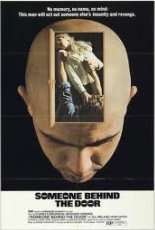
 After so much post-Psycho typecasting, it’s downright refreshing to see Anthony Perkins playing someone nice and normal in Someone Behind the Door. In the obscure thriller, he’s a timid, crippled florist threatened by the — oh, who’m I kidding? I can’t pull one over on you! He’s so totally bonkers! Again!
After so much post-Psycho typecasting, it’s downright refreshing to see Anthony Perkins playing someone nice and normal in Someone Behind the Door. In the obscure thriller, he’s a timid, crippled florist threatened by the — oh, who’m I kidding? I can’t pull one over on you! He’s so totally bonkers! Again!
Perkins is Dr. Laurence Jeffries, a brilliant brain surgeon whose latest patient is known to us only as “the stranger” (Charles Bronson). That’s because he’s a total amnesiac. Jeffries performs research on the stranger, but not the kind for which physicians are awarded massive grants. After assuring the stranger he’s not Victor Frankenstein, Jeffries invites him to his home, where he performs a “personality transplant.”
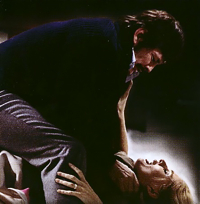 That’s the snazzy way of saying, “I’m going to make you think that my wife is really your wife, and then tell you that she’s been nailing some dude that isn’t me — er, you — and that you should do something about it, thereby letting me off the hook.” Oooooh, Mrs. Jeffries (Jill Ireland, of course), you are in troubbbbble!
That’s the snazzy way of saying, “I’m going to make you think that my wife is really your wife, and then tell you that she’s been nailing some dude that isn’t me — er, you — and that you should do something about it, thereby letting me off the hook.” Oooooh, Mrs. Jeffries (Jill Ireland, of course), you are in troubbbbble!
With so few people in the cast and most of the film taking place in one spot, Someone has the feeling of a great — okay, a pretty good — stage play. It’s a game of psychological one-upsmanship in the style of Sleuth or Deathtrap, but a couple levels below in the brains department. Bronson proceeds past his acting ability’s comfort zone in the finale, but I’m sure as hell not going to tell him that. —Rod Lott

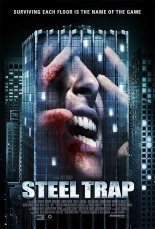
 In Japan,
In Japan, 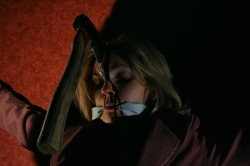 The table’s place settings sport not only the guests’ names, but unofficial titles like “Loser,” “Heartless” and “Two-Faced,” yet they don’t see anything wrong with that. The clues are given in nursery rhymes, yet they aren’t the least bit creeped out by them. The first one takes them to a disembodied pig’s head wearing a crown, yet they keep on going.
The table’s place settings sport not only the guests’ names, but unofficial titles like “Loser,” “Heartless” and “Two-Faced,” yet they don’t see anything wrong with that. The clues are given in nursery rhymes, yet they aren’t the least bit creeped out by them. The first one takes them to a disembodied pig’s head wearing a crown, yet they keep on going. 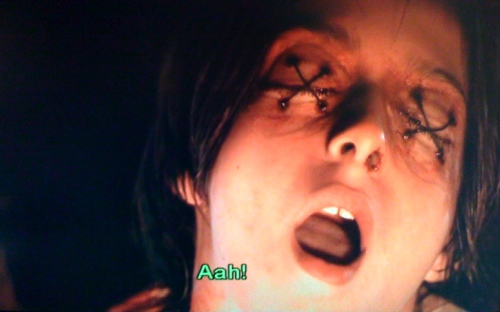
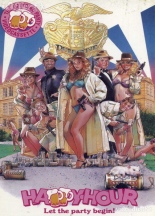

 Recognizable TV character actor Richard Gilliland stars as a chemist who accidentally discovers an additive that makes Marshall Beer dangerously addictive. The promotion that results enrages his lab partner/ex-girlfriend, prompting her to steal half of the formula and take it to Marshall’s largest competitor. Little, who limits himself to just one (terrible) Cary Grant impression, is the James Bond-like spy hired to steal the formula from Marshall, while sleazy scumbag Farr and his psycho partner Kitaen (in a clear bit of typecasting) are tasked to steal the formula from Marshall’s competition.
Recognizable TV character actor Richard Gilliland stars as a chemist who accidentally discovers an additive that makes Marshall Beer dangerously addictive. The promotion that results enrages his lab partner/ex-girlfriend, prompting her to steal half of the formula and take it to Marshall’s largest competitor. Little, who limits himself to just one (terrible) Cary Grant impression, is the James Bond-like spy hired to steal the formula from Marshall, while sleazy scumbag Farr and his psycho partner Kitaen (in a clear bit of typecasting) are tasked to steal the formula from Marshall’s competition.